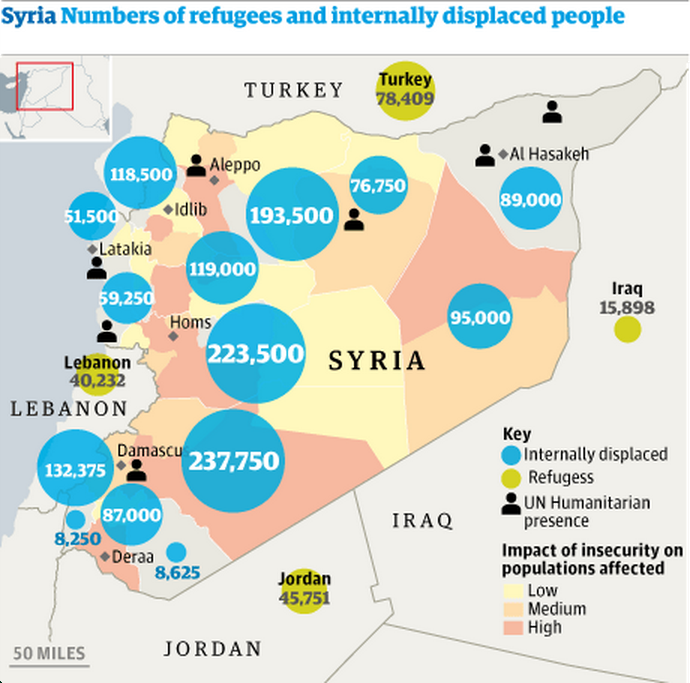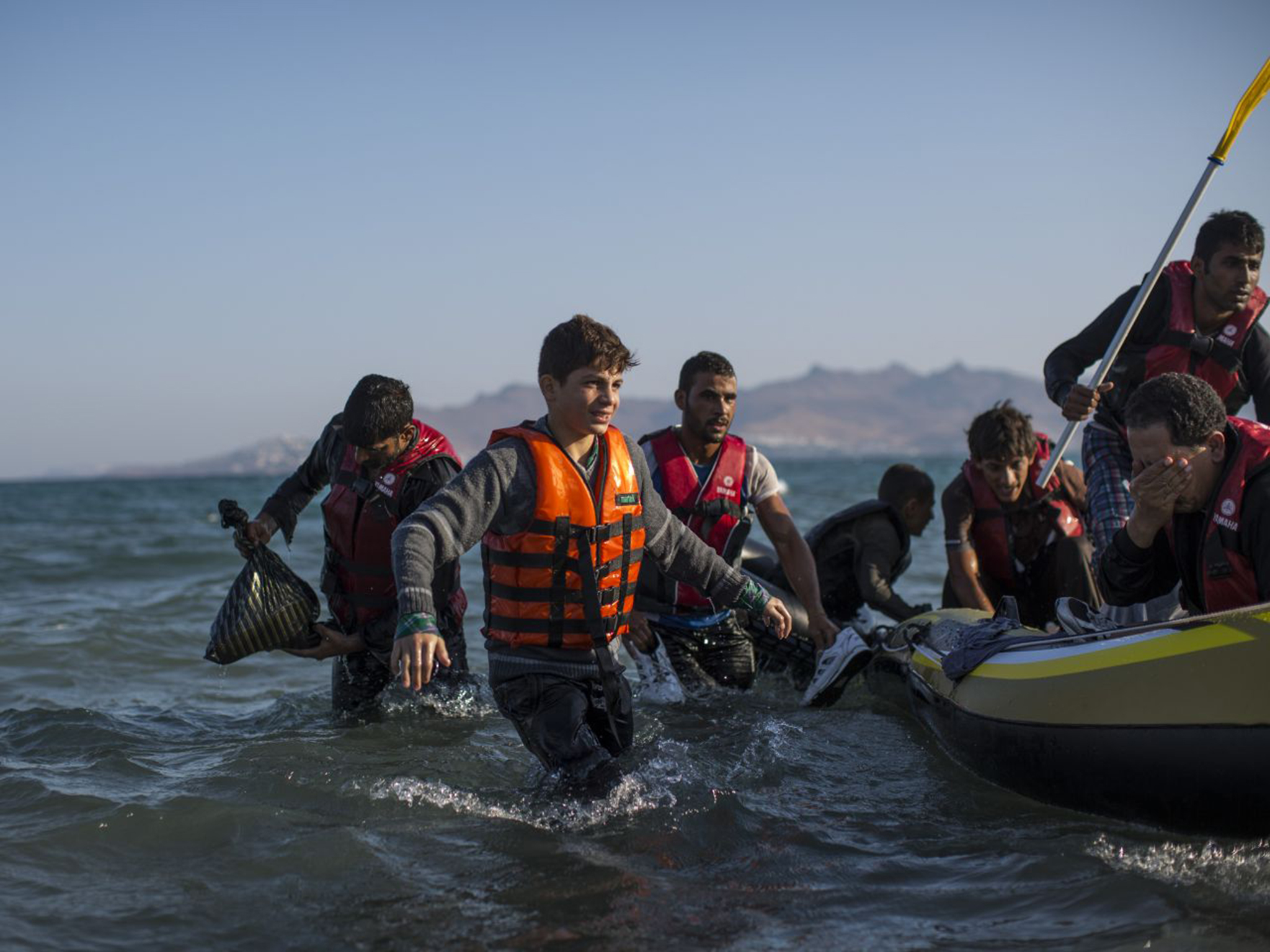
By: Korey Boehm
President Barack Obama boldly declared his support for the use of force to defend human rights abroad in March 2011 by referencing American military involvement in Libya. “To brush aside America’s responsibility as a leader and — more profoundly — our responsibilities to our fellow human beings under such circumstances would have been a betrayal of who we are,” Obama said. “Some nations may be able to turn a blind eye to atrocities in other countries. The United States of America is different.”
Only three years later, the innocent civilians of Syria would like an explanation from the President as to why this stance does not apply to them. In the midst of a ghastly civil war, Syria has become the world’s worst humanitarian crisis since the Rwandan genocide. The death toll has climbed to more than 140,000, and an astounding 6 million Syrians have become refugees forced from their homeland. According to the United Nations, “one-third of the country’s housing has been damaged or destroyed, … public services have been shattered, and … as of last month, nearly 40 percent of Syrian hospitals had been obliterated and 20 percent had been severely damaged.” These conditions have also led to outbreaks of polio, hepatitis, tuberculosis, and measles. To make matters even more difficult, the Syrian water supply has dwindled to one-third the amount available prior to the war.
The regime of Syrian President Bashar Al-Assad has consistently targeted innocent civilians and committed numerous crimes against humanity throughout the conflict. These atrocities have included blockades that have directly caused the starvation of children, the mass execution of political prisoners, and the use of indiscriminate weapons on apartment buildings, hospitals, and schools. Aside from verbal backlash, these mass murders of innocent civilians have taken place without minimal resistance from the international community, suggesting the world has sadly not learned from its genocidal past.
It is neither a secret nor a debate that the Obama administration’s Syria policy, if one does exist, has failed thus far. After previously referring to the conflict as “somebody else’s war,” President Obama vehemently declared that the use of chemical weapons by the Assad regime would mark a “line in the sand,” justifying U.S. military intervention. However, when the Syrian President killed more than 1,400 people, including children, in a chemical attack last August, Obama allowed the dictator to successfully call his bluff.
Rather than intervening, the United States brokered a deal with Russia that would have them ensure the removal of all chemical weapons from their Syrian ally. Those efforts have proved fruitless six months later, as Assad has still not handed over his chemical weapons, missing multiple deadlines set by the UN, which has confirmed that more than 95.5 percent of those weapons remain in Syria’s possession. Since the decision against Syrian intervention was made in September, the chaos and destruction have only gotten worse: 40,000 more people are dead, women and children continue to be targeted by Syrian troops, and the rebels fighting Assad have been significantly weakened. The deal also returned our Russian rival to the center of Middle East power politics while failing to achieve any of its stated goals, marking Obama’s only legitimate Syrian policy undoubtedly a failed one, as Secretary of State John Kerry admitted himself last week.
In the past few months, the American perspective on the crisis has shifted from a humanitarian issue to a strategic dilemma with the rise of al-Qaeda cells in Syria. This was made clear last week when the Director of National Intelligence, James R. Clapper Jr., testified before Congress that “Syrian al-Qaeda forces aspired to carry out attacks against the U.S. homeland.” Having previously referred to the Syrian al-Qaeda branch as the “JV team,” President Obama quickly changed his tone after that testimony. Finally acknowledging the legitimacy of that threat, President Obama admitted “there are extremists who have moved into the vacuum in certain portions of Syria in a way that could threaten us over the long term.”
The Obama administration has adamantly held that any U.S. intervention would be ineffective, “short of us being willing to undertake an effort in size and scope similar to what we did in Iraq.” However, the consensus from the international community is that there exist several options for action in Syria that would be more effective than current policy and remain shy of employing American troops on the ground.
The simplest measure to enact would be to support a resolution being developed by the U.N. Security Council that would allow for “humanitarian aid deliveries to areas now cut off because of military sieges and authorize U.N. agencies to work in areas not under government control.” The Obama administration could also take steps to end the starvation-causing blockades and the other war crimes being committed daily by Assad.
Most notable of these crimes is the dropping of barrel bombs, which are filled with nails and shrapnel to inflict maximum damage, on civilian housing, hospitals, and schools. To avert these atrocities against innocent civilians, Obama could threaten missile strikes against the facilities that carry out the barrel bomb attacks, such as helicopter bases, knowing that Assad cannot afford to lose essential artillery.
To address the threat of al-Qaeda cells in Syria, the most direct threat to U.S. national security, Mr. Obama could circle back to an initiative he embraced and subsequently abandoned last year: the arming and training of moderate opposition forces. The reality of the situation is that the fighting on the ground will ultimately play the biggest role in Syria’s short-term future in addition to any potential settlement in the future. Russia, Iran, and Saudi Arabia have all realized this and are supporting various Syrian forces. The United States and its allies would therefore be wise to train and equip the rebel forces, which would be able to battle both the Assad regime as well as al-Qaeda.
Inaction on the part of the United States over the past six months has left the Obama administration with increasingly difficult decisions. Nevertheless, valid policy options still exist, and it is never too late to stand against a developing terrorist threat and, more importantly, unrelenting violence against innocent civilians.
This situation does not have a clear solution. Each decision has consequences of its own, and it neither convenient nor idyllic for the United States to enter another conflict in the Middle East. However, Thomas Jefferson once said “If there’s something wrong, those who have the ability to take action have the responsibility to take action.” America is one of the few countries worldwide with the ability to end these brutalities, and it is therefore their responsibility to do so.

